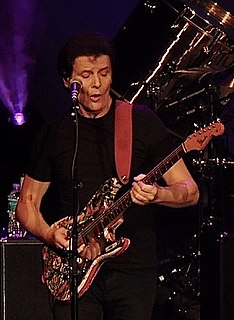Top 36 Quotes & Sayings by Trevor Rabin
Explore popular quotes and sayings by a South African musician Trevor Rabin.
Last updated on April 14, 2025.
We were a very politically active family. My father was one of the first lawyers in South Africa to have a black partner, so I grew up very aware of the struggle going on. Coming from that background, it really gave me chills to have my music be a part of the election of the first black American president.
In my day, when I was a young kid, army duty was compulsory in South Africa or you go to jail. I had the choice, so I spent a year in the entertainment unit, and outside of doing shows - and I used to write for, arrange for the big band - outside of doing that, I actually had a rock band in the army.
I belong in America more than South Africa. I can't remember the feeling of living there anymore. It's like it was in another life. That's sad in a way. It is my country. It's where I grew up. You don't know what it's like to have these negative feelings about your homeland. There are roots you can't escape.
I'm happy to say that I have not been fired off a film. The score is usually the last thing to be done. So a lot lands on the scores shoulders. A lot of problems that seem to have nothing to do with the music gets blamed on the music , because it's relatively cheap to change, where as a reshoot etc is not. Music is often expected to help or fix bad cuts, bad acting, bad filming, bad timing, you name it.




















